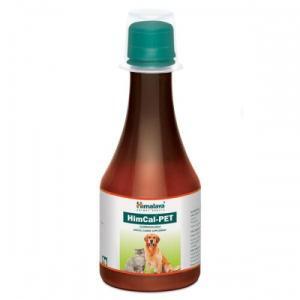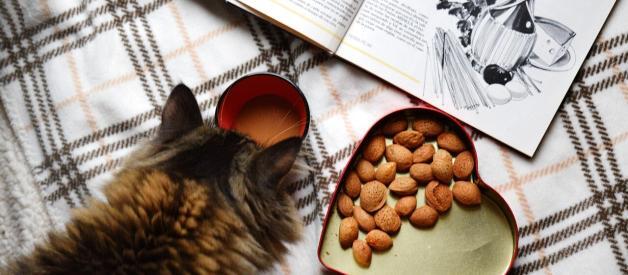Table of Contents
Calcium and phosphorus are vital minerals for cats and dogs. They are essential for strong bones, teeth, and muscle function. These minerals also affect nerve transmission, cellular processes, and hormonal regulation. Insufficient calcium and phosphorus can lead to weak bones, dental issues, and overall health problems. Ensuring proper intake through diet or supplements is crucial for their well-being.

What Is HimCal Pet Suspension?
HimCal for Pets is a specialized formulation enriched with the goodness of calcium and phosphorus sourced from oyster shells. This exceptional product maintains a balanced 1:0.8 ratio of calcium to phosphorus, aligning with the Association of American Feed Control Officials (AAFCO) recommendations. Notably, HimCal features a delectable milky flavor that pets adore, ensuring a pleasant experience during consumption.
Beyond its palatability, HimCal serves as an essential companion, enhancing bone density and strength.
Administering HimCal is effortless, as it can be conveniently administered orally or mixed with food. Each bottle of HimCal contains 200 ml of this potent solution.
Ingredients
Phosphorus is a fundamental mineral present in the bodies of cats and dogs. It plays a critical role in various physiological processes, primarily in the form of phosphate compounds. In conjunction with calcium, phosphorus contributes to developing and maintaining strong bones and teeth, ensuring structural integrity. Additionally, phosphorus is essential for energy metabolism, supporting cellular functions, and aiding in the synthesis of DNA and RNA. However, maintaining a proper balance between calcium and phosphorus is crucial, as an imbalance can lead to health complications such as skeletal issues and kidney problems.
Calcium is a cornerstone mineral necessary for the well-being of cats and dogs. It is a vital component of bones and teeth, imparting strength and rigidity to the skeletal structure. Beyond its role in structural support, calcium is integral to muscle contraction, nerve transmission, and blood clotting. Moreover, it participates in enzymatic reactions, influencing processes like hormone secretion and cellular signaling. For pets, achieving an optimal calcium intake is essential for maintaining proper growth, development, and overall physiological function. A balanced calcium-phosphorus ratio is crucial to ensure the harmonious functioning of these two minerals in the body.
Dosage Sizes
| Pet |
Dosage Recommendations |
|
|
Morning |
Evening |
|
|
Puppies and Small Dogs |
5-10 ml |
5-10 ml |
|
Adults and Large Dogs |
10-20 ml |
10-20 ml |
|
Cats |
Consult veterinarian |
|
Important Safety Information for Pet Owners
Before incorporating HimCal Pet Suspension into your pet’s routine, it’s crucial to consult your veterinarian. They can assess your pet’s health needs and guide dosage and suitability.
Adhere strictly to the recommended dosages your veterinarian provides. Overdosing can lead to potential health risks, while underdosing might not yield the desired benefits.
Keep a close eye on your pet’s response to HimCal. Observe for any adverse reactions or changes in behavior. If you notice anything unusual, discontinue use and consult your veterinarian.
Inform your veterinarian about any other medications, supplements, or health conditions your pet might have. Some interactions could affect the effectiveness or safety of HimCal.
Be vigilant about potential allergies. If your pet shows signs of an allergic reaction, such as itching, swelling, or difficulty breathing, seek immediate veterinary care.
Veterinary Prescription
In many regions, pet supplements like HimCal Pet Suspension might not always require a veterinary prescription for purchase. They are often available over the counter at pet stores, online retailers, and veterinary clinics.
Regulations and requirements might vary depending on your location and local laws. To get the most accurate and up-to-date information, contact your local veterinary clinic, pet stores, or the manufacturer of HimCal Pet Suspension. They can provide information about whether a prescription is needed for purchasing the product in your area.

Interactions
Interactions between supplements and medications can significantly affect your pet’s health. Here are some general considerations to keep in mind:
- Medication Interactions: Some medications may interact with calcium and phosphorus supplements like HimCal. For example, certain medications that affect calcium absorption or metabolism might interact negatively with HimCal.
- Calcium Competitions: Some medications might compete with calcium for absorption in the body. This can impact the effectiveness of both the medication and the supplement.
- Vitamin D: Vitamin D plays a crucial role in calcium metabolism. If your pet is on medications that affect vitamin D levels or metabolism, there could be potential interactions with a calcium supplement.
- Kidney Disease: Pets with kidney disease might have altered calcium and phosphorus metabolism. Adding a supplement without consulting your vet can lead to imbalances and complications.
- Blood Clotting: Calcium is involved in blood clotting. Certain medications that impact blood clotting might interact with calcium supplements.
- Individual Sensitivity: Like humans, pets can be sensitive to different substances. Your vet can help determine if your pet will likely react adversely to HimCal.
- Timing: The timing of medication and supplement administration can also affect interactions. Your vet can guide you on how to space out the administration of different substances.
- Monitoring: Whenever introducing a new supplement, it’s essential to closely monitor your pet for any changes in behavior, appetite, or health. If you notice anything unusual, consult your vet.
Remember, only your veterinarian has a comprehensive understanding of your pet’s health profile and medical history, making them the best source of advice regarding interactions between HimCal Pet Suspension and any medications your pet might be taking. Always prioritize your pet’s safety and well-being by seeking professional guidance.
Side Effects
Some potential side effects could include:
- Gastrointestinal Upset: Supplements containing calcium and phosphorus can sometimes cause gastrointestinal discomfort, including vomiting, diarrhea, or stomach upset. This is especially true if the supplement is introduced suddenly or excessively.
- Calcium Imbalance: Overdosing on calcium can lead to an imbalance with other minerals in the body, potentially causing problems like kidney stones, urinary issues, or disturbances in electrolyte levels.
- Soft Tissue Mineralization: Excessive calcium intake can result in soft tissue mineralization, where calcium is deposited in soft tissues like organs or blood vessels, potentially leading to health issues.
- Interaction with Medications: Calcium supplements can interact with certain medications, potentially reducing the effectiveness of the medication or causing adverse reactions.
- Allergic Reactions: Some pets may have allergic reactions to certain supplement components. Watch for signs like itching, swelling, or breathing difficulties.
- Calcium-Phosphorus Imbalance: An incorrect ratio of calcium to phosphorus can disrupt the delicate balance necessary for proper bodily functions, leading to skeletal and metabolic issues.
- Underlying Health Conditions: If your pet has existing health conditions, such as kidney disease or disorders affecting calcium metabolism, introducing a supplement like HimCal should be done cautiously and under veterinary guidance.
- Sensitive Stomach: Pets with sensitive stomachs might be more prone to experiencing gastrointestinal upset when introduced to new supplements.
- Monitoring and Adjustment: It’s crucial to start with the recommended dosage and monitor your pet’s response. Your veterinarian might need to adjust the dosage based on your pet’s needs.
Remember, the potential for side effects can vary depending on the individual pet’s health, existing conditions, and the specific formulation of the supplement.
Overdose
An overdose of any supplement, including HimCal Pet Suspension, can potentially lead to adverse effects in your pet. Here are some general considerations about the potential consequences of an overdose of calcium and phosphorus supplements:
- Calcium Imbalance: Excessive calcium intake can lead to an imbalance with other minerals in the body, particularly phosphorus. This can disrupt the body’s natural regulatory mechanisms and lead to health issues.
- Urinary Issues: High calcium levels can contribute to kidney stones or urinary crystals forming. This can result in discomfort, pain, and potential urinary blockages.
- Soft Tissue Mineralization: Excessive calcium can be deposited in soft tissues such as organs and blood vessels, leading to a condition known as soft tissue mineralization. This can impair organ function and cause health problems.
- Gastrointestinal Distress: Overdosing on supplements can lead to gastrointestinal upset, including vomiting, diarrhea, and stomach discomfort.
- Interference with Medications: An overdose of supplements can interfere with medications your pet might be taking, potentially reducing the effectiveness of those medications or causing harmful interactions.
- Skeletal Abnormalities: Overloading on calcium and phosphorus, especially during periods of rapid growth in puppies or kittens, can lead to skeletal abnormalities and growth issues.
It’s crucial to follow the recommended dosage guidelines provided by your veterinarian or on the product label. If you suspect your pet has ingested an excessive amount of HimCal Pet Suspension, immediately contact your veterinarian or an emergency veterinary clinic. They can guide you on how to proceed based on your pet’s situation.
Storage
Store HimCal Pet Suspension in a cool, dry place, away from direct sunlight and heat sources. Excessive heat or moisture can degrade the quality of the product.
Ensure the bottle’s cap or lid is tightly closed when not used. This helps prevent air and moisture from entering the bottle, which can impact the supplement’s stability.
Store supplements in a location that is out of reach for pets and children. This prevents accidental ingestion, which could be harmful.
Avoid storing the supplement in temperatures that lead to freezing, as freezing can affect the consistency and efficacy of the product.
It’s generally best to store supplements in their original containers. This helps ensure the container is designed to maintain the supplement’s quality.
Store HimCal Pet Suspension away from strong-smelling substances, as the supplement might absorb odors.
FAQ
Can I give HimCal to both cats and dogs?
Yes, HimCal Pet Suspension is suitable for both cats and dogs. However, following the recommended dosage based on your pet’s size and age is essential.
How do I administer HimCal Pet Suspension to my pet?
HimCal can be administered orally or mixed with food. Refer to the dosing guidelines provided by your veterinarian or on the product label.
Can I give my pet more HimCal if I think they need it?
It’s crucial to follow the recommended dosage guidelines. Overdosing can lead to health issues. Always consult your veterinarian before making any changes to the dosage.
Can HimCal Pet Suspension replace regular veterinary care?
No, HimCal is a supplement, not a substitute for regular veterinary check-ups. Maintaining routine veterinary care for your pet’s overall health is important.
Can I store the HimCal Pet Suspension in the refrigerator?
Refrigeration might be necessary after opening, depending on the product’s instructions. Always refer to the label for specific storage guidelines.
Can I use HimCal for my pregnant or lactating pet?
Pregnant or lactating pets have unique nutritional needs. Consult your veterinarian before giving any supplement, including HimCal, during these periods.
How often should I give HimCal Pet Suspension to my pet?
Dosage frequency depends on your pet’s size and age. Generally, HimCal is given twice daily. Follow the dosing guidelines provided by your vet or on the label.
Olivia Bennet is a veterinarian who has worked in a veterinary clinic for many years. She specializes in the diagnosis, disease prevention, and treatment of not only cute kittens and puppies but also large farm animals. Olivia loves animals, cares about them, and wants to help you know more about your pets.

































